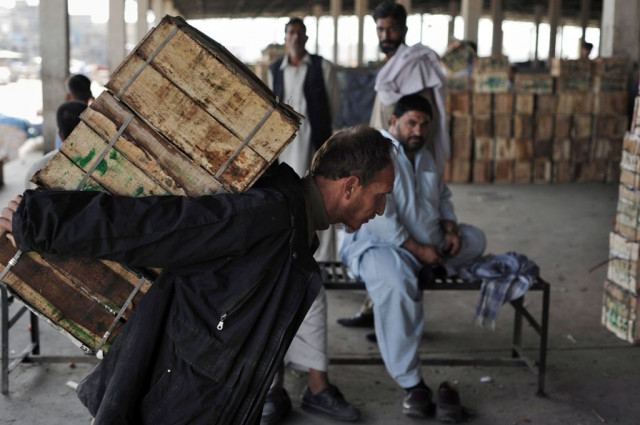New firm using cheap labour has no room for old stevedores
Dock workers at Port Qasim have not been paid salaries for the last seven months.

Baitullah is in trouble. As Eid approaches, he – like all other labourers at Port Qasim – is waiting to be paid. Their salaries have not come for the past seven months. He has no money to pay for bus fare or buy new clothes for his children, who have been waiting for him back home in Khyber-Pakhtunkhwa for over a year now. He fears that he will not be able to be with them this Eid.
“I have not sent a single rupee to my children in these seven months and I have no other way to earn,” said Baitullah, who lives in a small rented room in Keamari. He travels all the way to Port Qasim daily in the hope of hearing he will be paid.
“There is no work for us at the port. The authorities want us to leave the docks so that they can bring their own labour,” he claimed. “We developed this area from a forest to a port but now we have no rights over it.”
About 1,880 dock workers have been affected financially since the military-owned Fauji Akbar Portia (FAP) Marine Terminal was launched at Port Qasim in 2010 and the company brought in its own labour. “The labourers were getting their rights and privileges until 2010, but now some of them are selling samosas at railway stations,” explained Gul Mohammad Mamoond, who represents them through the Port Qasim Dock Workers Social Development Forum.
According to him, the Port Qasim Authority (PQA) and FAP had signed an agreement under which the firm owned by the Fauji Foundation could handle bulk cargo. “[But] the firm later breached the agreement and started dealing with containers and captured the cargo consignments also,” he alleged.
Dock worker salaries and other allowances used to be paid from a “common pool” of the stevedoring companies, according to Gul Mohammad Afridi of the Workers Union of Port Qasim. All stevedoring firms used to contribute Rs120 per tonne of cargo handled at the port. “Eleven of them left [the port] when FAP started operating and took over the work load,” Afridi said. “When they protested for their rights, they were baton charged by the Rangers.”
The labour union president termed the agreement signed between FAP and Port Qasim as illegal and said it could be challenged in court. “[But] cases take a lot of time and are a waste of time and money,” he said. An official at FAP refuted the allegations of stevedores and labour unions. Speaking on condition of anonymity, he said that FAP was a private terminal and the company had an agreement with the PQA to handle bulk and bagged cargo. “There is no obligation to hire these workers in the agreement,” he said. “We are already running at a loss and can’t afford the stevedores as they charge more than the labourers we hire through contractors.” While he was not willing to give an exact number, he gave the example of Rs30 per tonne as what they pay their labour, which is much lower than the Rs170 per tonne that the stevedores ask.
Published in The Express Tribune, August 7th, 2012.



















COMMENTS
Comments are moderated and generally will be posted if they are on-topic and not abusive.
For more information, please see our Comments FAQ